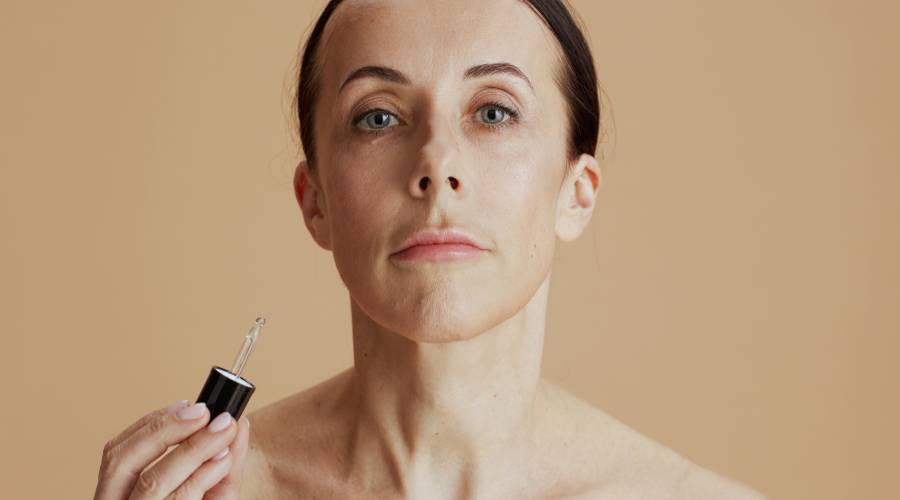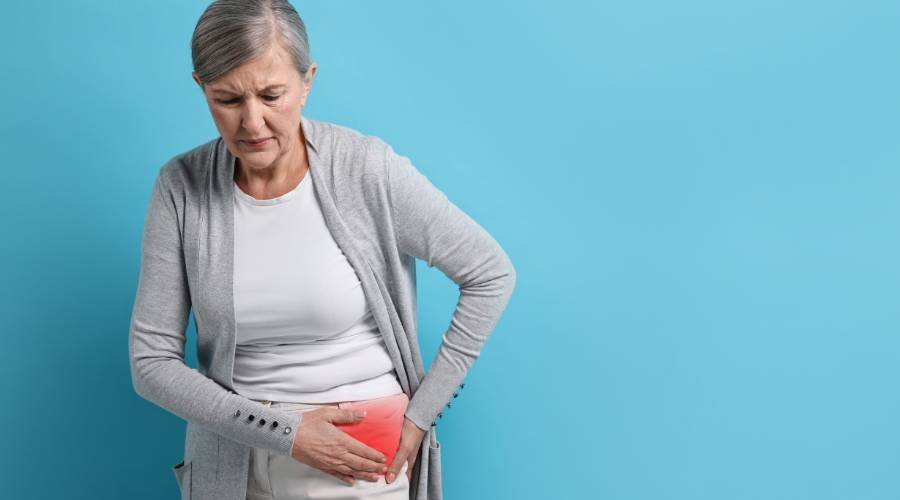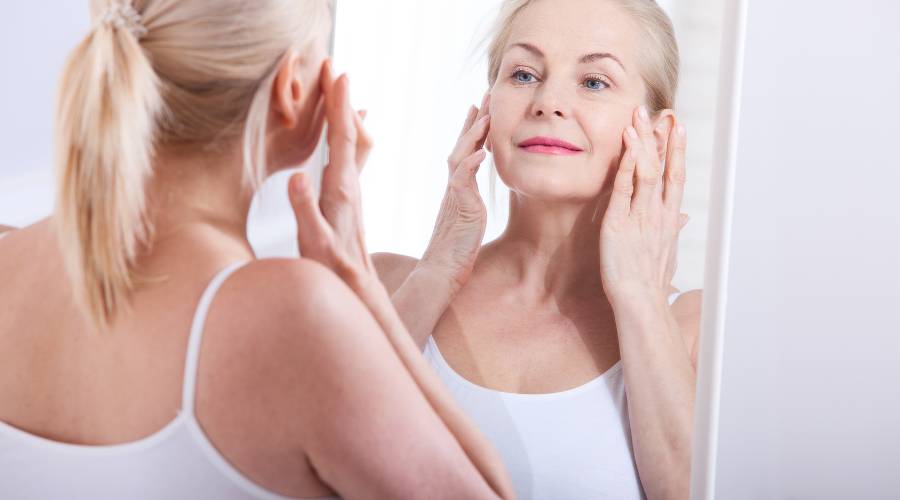Collagen is the most abundant protein in your body. It is essential for maintaining healthy skin, flexible joints, resilient cartilage, and strong connective tissues. However, as you age—especially after 45—your body naturally produces less collagen. This decrease often manifests as joint stiffness, discomfort, loss of skin elasticity, fine lines, and dryness.
For women over 45, these changes can feel sudden and frustrating. Collagen for joint pain and skin health has become a popular topic in wellness circles for good reason. Many seek solutions to regain comfort in their movement and restore that youthful glow.
But can collagen help with joint pain and skin health? This article explores the science behind collagen benefits over 45 and what you need to know before choosing supplements or making lifestyle changes.
Understanding Collagen and Its Role in the Body
Collagen is the most abundant protein in the human body, making up nearly one-third of total protein content. It serves as a structural support system, providing strength and flexibility to various tissues such as skin, joints, cartilage, tendons, ligaments, and bones. As we age, our bodies produce less collagen, leading to a loss of resilience in these connective tissues.

The Importance of Collagen Types
When it comes to supplements and targeted support, different types of collagen play a significant role:
- Type I Collagen: Found primarily in skin, tendons, bones, and ligaments. It promotes firmness and elasticity in the skin while also aiding in wound healing.
- Type II Collagen: Concentrated in cartilage, this type helps cushion the joints and ensures smooth movement. It is particularly beneficial for individuals experiencing joint pain or stiffness.
- Type III Collagen: Often found alongside Type I collagen, it supports the structure of muscles, organs, and arteries and contributes to maintaining youthful-looking skin.
The Function of Collagen
The main function of collagen is to provide support to connective tissues. It acts as a glue that holds everything together by forming a network of fibers. This network helps maintain the structural integrity of tissues during daily activities such as walking, lifting objects, or stretching the skin.
As we age or if there are factors affecting collagen production (such as poor diet or lifestyle choices), the quantity and quality of collagen in our bodies may decline. This can result in visible signs like joint discomfort or sagging skin.
The Impact on Aging Connective Tissues
The type and quality of collagen we consume through food or supplements can influence how strong our connective tissues remain as we grow older. Each type of collagen has its specific role in supporting different areas, like the skin or joints.
Understanding this knowledge can guide us in making informed decisions about which supplements to choose based on our individual needs.
Why Collagen Declines with Age and Its Impact on Women Over 45
Collagen production naturally starts to decline around age 25-30, with a more noticeable acceleration after age 45. This decline is particularly pronounced in women due to hormonal changes associated with menopause. Menopause effects on collagen are significant; estrogen plays a key role in collagen synthesis, so its reduction during menopause results in decreased skin elasticity and joint comfort.
Several lifestyle factors can worsen collagen loss:
- Smoking: Nicotine impairs collagen production, leading to premature skin aging and increased joint discomfort.
- UV Exposure: Ultraviolet rays break down collagen fibers in the skin, accelerating aging signs like wrinkles and sagging.
- Poor Sleep: Inadequate sleep disrupts the body’s repair processes, reducing natural collagen synthesis and impacting overall skin health.
Understanding these factors helps you appreciate why collagen supplements might be beneficial, especially for women over 45. By addressing both natural aging processes and lifestyle influences, you can make more informed decisions about your skincare and joint health strategies. Maintaining optimal collagen levels becomes crucial for sustaining skin vitality and joint mobility as you age.
How Collagen Supports Skin Health Over 45
Collagen is critical for keeping skin looking and feeling youthful. Type I and Type III collagen form the foundation of healthy, resilient skin. These proteins provide structure, maintain elasticity, support skin hydration as we age, and help prevent thinning or fragile skin. When you have optimal levels of these collagens, your skin appears firmer, smoother, and more luminous.
Reduced collagen production—a natural part of aging—leads to noticeable changes:
- Wrinkles become more pronounced as the skin loses its ability to bounce back.
- Sagging develops around the jawline, cheeks, and neck as the underlying matrix weakens.
- Dryness and dullness increase due to compromised hydration within deeper skin layers.
Research on collagen peptides for skin highlights real benefits for mature women. Several studies show that daily supplementation with hydrolyzed collagen peptides can improve moisture retention, boost firmness, and reduce fine lines over several months. For instance, clinical trials in women aged 45+ found significant improvements in skin hydration, aging, elasticity, and overall appearance after consistent use of anti-aging skincare supplements containing bioavailable collagen.
Using quality collagen for joint pain and skin targets both visible concerns and comfort, supporting a comprehensive approach to skin health over 45.
Collagen’s Role in Relieving Joint Pain and Supporting Mobility
Importance of Type II Collagen for Cartilage Health and Joint Function
Type II collagen is crucial for maintaining the structure and function of cartilage, which cushions joints and supports smooth movement. As a key component of the extracellular matrix in cartilage, this collagen type helps preserve joint integrity and reduce friction during activities.
How Declining Collagen Contributes to Joint Stiffness and Osteoarthritis Symptoms Common Over Age 45
With age, the body’s natural production of collagen decreases, leading to weaker cartilage and increased susceptibility to joint pain and stiffness. Women over 45 often experience symptoms of osteoarthritis, such as swelling, reduced mobility, and discomfort due to deteriorating cartilage.
Research Findings Supporting Hydrolyzed and Undenatured Type II Collagen Supplementation to Reduce Joint Pain and Improve Mobility
Studies have shown that supplementing with hydrolyzed collagen peptides can improve joint pain relief by enhancing cartilage regeneration. Undenatured type II collagen has been observed to support immune responses that help reduce inflammation in joints. Both forms of supplementation are effective in improving mobility, thereby alleviating symptoms associated with osteoarthritis.
By integrating type II collagen into your wellness routine, you can support your joint health and maintain an active lifestyle even as you age.
Types of Collagen Supplements Explained: What Works Best?
Collagen supplements come in distinct forms, each with unique benefits and absorption profiles. Two popular types dominate the conversation: hydrolyzed collagen peptides and undenatured type II collagen (UC-II®).
1. Hydrolyzed Collagen Peptides
These are collagen proteins broken down into smaller peptides for improved bioavailability. Your body absorbs hydrolyzed peptides efficiently, making them a leading choice for skin elasticity, hydration, and general connective tissue support. Most powders and capsules labeled as “collagen peptides” fall into this category and typically derive from bovine (cow), porcine (pig), or marine (fish) sources.
2. Undenatured Type II Collagen (UC-II)
This form remains closer to its natural structure. A tiny daily dose can help modulate the immune response involved in joint inflammation, particularly for joint pain and mobility. UC-II works differently from hydrolyzed peptides, supporting cartilage health via immune pathways instead of simply replenishing lost structural protein.
3. Animal-Derived vs Plant-Based
All true collagen supplements come from animal sources—bovine, porcine, or fish. Plant-based “collagen boosters” do not contain actual collagen; instead, they supply nutrients like vitamin C or amino acids that may help your body make more of its collagen. For those prioritizing vegan-friendly options, these boosters offer a clean alternative but do not replicate the structural effects of animal-derived collagen.
Selecting a supplement means weighing purity, source transparency, and dietary preferences. Many women choose clean-label, non-GMO, gluten-free products to align with wellness goals while supporting ethical sourcing standards.
Next steps in supporting healthy skin and joints often involve combining smart supplementation with holistic lifestyle strategies that optimize your body’s natural repair systems.
LiveGood Collagen Products: Clean, Ethical Options for Women Over 45
LiveGood wellness products offer scientifically backed supplements designed with clean ingredients to support women over 45. These collagen supplements focus on providing non-GMO and gluten-free standards, ensuring quality and safety.
Key Features of LiveGood Collagen Products
- Vegan options available: LiveGood understands the importance of ethical consumption, offering vegan-friendly collagen alternatives where applicable.
- Affordable solutions: By joining the Passive Path Club community, members can save up to 80% on wellness essentials. This makes it easier to maintain a consistent collagen supplementation routine without breaking the bank.
- Transparency and ethical practices: LiveGood stands out by supporting women seeking wellness through clear and honest communication. Their affiliate opportunities are structured to be ethical, providing a trustworthy platform for earning while promoting health.
LiveGood’s commitment to clean, affordable collagen supplements helps address joint pain and skin health effectively. Additionally, they offer products like the Ultra Magnesium Complex, which can further support overall wellness. With a focus on hormonal balance for women, these supplements are tailored to meet the unique needs of women over 45.
Supporting Your Skin and Joint Health Holistically Beyond Collagen
Maintaining healthy skin and joints goes beyond collagen supplementation. Incorporating complementary wellness habits can significantly enhance natural collagen production and overall health.
Balanced Diet for Natural Collagen Synthesis
A diet rich in vitamin C and amino acids is essential for supporting your body’s natural collagen synthesis. Foods like citrus fruits, berries, leafy greens, fish, and lean meats provide these vital nutrients. Vitamin C plays a critical role in stabilizing the collagen molecule, while amino acids are the building blocks for collagen production.
Good Sleep Hygiene
Quality sleep is crucial for reducing inflammation that affects both joints and skin health. Establishing a consistent sleep routine helps your body repair and regenerate tissues, including collagen-rich structures. Aim for 7-9 hours of sleep each night to optimize these benefits.
Avoiding Harmful Habits
Certain lifestyle choices can accelerate collagen degradation:
- Smoking: Reduces oxygen supply to tissues, impairing collagen synthesis.
- Excessive UV Exposure: UV rays break down collagen fibers, leading to premature skin aging.
Limiting these habits will help preserve existing collagen and support overall health.
Implementing these strategies alongside collagen supplements can lead to better joint care routines for aging women and healthier skin over 45.

Real Stories from Women Like You: Alicia’s Journey with Collagen at Age 67
Alicia, age 67, joined the Passive Path Club seeking relief from restless nights and aching joints that made daily life feel like a challenge. She chose LiveGood collagen supplements after researching clean, ethical options that fit her commitment to wellness. Her testimonial highlights the tangible LiveGood collagen supplement benefits experienced by many older women:
- Improved Sleep Quality: Alicia describes falling asleep faster and waking up refreshed—something she hadn’t felt in years. Consistent use of the collagen blend became a cornerstone for calmer evenings and deeper rest.
- Renewed Energy: Days that once dragged now feel lighter. Alicia noticed a steady increase in energy levels, allowing her to return to gardening and walking with friends—activities she missed when fatigue held her back.
- Reduced Joint Discomfort: Joint pain, especially in her knees and hands, eased after a few weeks of supplementation. Simple tasks like opening jars or getting up from low chairs became less daunting.
“The support I found here is as valuable as the supplements. There’s real encouragement, not just sales talk—people share recipes, routines, even setbacks. It feels good knowing I’m not doing this alone.”
Alicia’s story mirrors many older wellness stories: practical results paired with genuine community support. The Passive Path Club empowers women like Alicia to maintain purpose-driven routines and stay consistent with healthy habits.
Conclusion
While collagen supplements can be beneficial, it’s important to maintain realistic expectations. Collagen should be viewed as part of a holistic approach to wellness rather than a miracle cure. For aging women, the effectiveness of collagen supplements in supporting joint pain and skin health is enhanced when combined with healthy lifestyle choices.
- Explore ethical supplement options like LiveGood for clean, scientifically-backed products.
- Combine collagen supplementation with habits such as balanced nutrition, good sleep hygiene, and avoiding harmful practices.
By integrating these approaches, you can achieve better results and support your overall well-being.
FAQs (Frequently Asked Questions)
What is collagen, and why is it important for joint pain and skin health, especially after age 45?
Collagen is the most abundant protein in the body that supports skin, joints, cartilage, and connective tissues. After age 45, natural collagen production declines, impacting skin elasticity and joint comfort. Supplementing collagen can help maintain structural integrity and alleviate symptoms related to aging.
How does aging affect collagen levels in women over 45, and what lifestyle factors contribute to its decline?
Starting around age 25-30, collagen production naturally decreases, accelerating after 4,5, particularly due to menopause effects. Lifestyle factors like smoking, UV exposure, and poor sleep further reduce collagen levels, leading to wrinkles, sagging skin, and joint stiffness.
Which types of collagen are most beneficial for skin health and joint support?
Type I and III collagen play key roles in maintaining skin elasticity, hydration, and density. Type II collagen is crucial for cartilage health and joint function. Supplements containing hydrolyzed peptides or undenatured type II collagen can effectively support skin appearance and relieve joint pain.
What are the differences between hydrolyzed collagen peptides and undenatured type II collagen supplements?
Hydrolyzed collagen peptides are broken-down forms that enhance absorption and primarily support skin health. Undenatured type II collagen supports immune function related to cartilage health and helps reduce joint pain. Choosing the right type depends on your specific skin or joint health goals.
How does LiveGood offer clean and ethical collagen supplements suitable for women over 45?
LiveGood provides scientifically-backed wellness products with clean ingredients, including vegan options where applicable. Their supplements are non-GMO, gluten-free, affordable through membership savings, and focus on transparency and ethical sourcing to support women’s joint pain relief and skin health.
What holistic lifestyle practices complement collagen supplementation for optimal skin and joint health after 45?
A balanced diet rich in vitamin C and amino acids supports natural collagen synthesis. Good sleep hygiene reduces inflammation affecting joints and skin. Avoiding smoking and excessive UV exposure preserves existing collagen. Combining these habits with ethical supplementation like LiveGood maximizes benefits for mature women.




